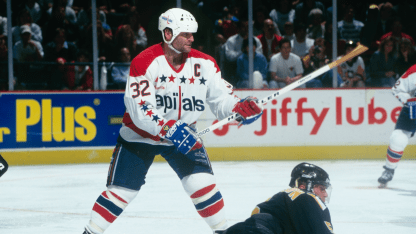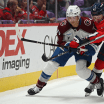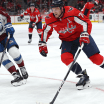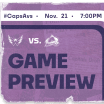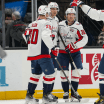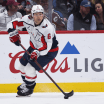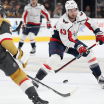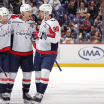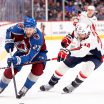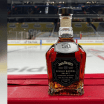Throughout the years, win or lose, regardless of personnel, one thing has remained fairly constant about the Capitals. If you're the opposing team and you're going up against the Caps, you know you're in for a struggle from the opening faceoff to the final horn. That's how Dale Hunter played it every night-1,407 times over 19 seasons.
Few figures in Washington sports have been as beloved by fans over the last few decades. He brought a quiet, workmanlike efficiency to the ice. He wasn't looking for approval, or glamour or accolades. He didn't care about scoring goals or padding his stat totals. He cared about one thing-winning.
"He taught me a lot of things," says Capitals defenseman Brendan Witt. "He taught me how to play hard and to pick your spots [to make a hit]. And every night he came to play. I really admire that. As a kid I grew up watching him with the Nordiques and the Capitals. I remember the first time I met him, he was on the Stairmaster. He looked like a normal little guy. I thought, 'He doesn't look much like a killer, but he's got the reputation.' But just to be in his presence; he is a great hockey player with a lot of hockey smarts. He is great for the game. I admire him a lot, he came to play every night and I think he did a lot for this organization."
"It was awesome playing with Dale Hunter," says Steve Konowalchuk, who cut his NHL teeth playing on a line with Hunter and Kelly Miller. "He was such a smart player and he came to play every night. I played seven, eight years with him and I don't know if I can remember a bad game he had. That's pretty amazing. Every night he came and played good. That's what I really learned. Yeah, he had skill and they had talent. But he was mentally ready every game. And that is what I strived to learn from him."
It wasn't like Hunter became that player upon arriving in Washington, either. He broke into the NHL with the Quebec Nordiques on October 9, 1980 and made his mark right away. Hunter registered 19 goals and 63 points as a rookie; he also racked up 226 penalty minutes. It would be the first of 10 seasons in which he would spend more than 200 minutes in the penalty box.
With the high-flying Nordiques, Hunter served two purposes and served them both well. His gritty nature often overshadowed his other hockey skills, but he was a tremendous playmaker with excellent vision. With the Nords, Hunter skated with Michel Goulet, who was enshrined in the Hockey Hall of Fame in 1998. With Hunter as his regular center, Goulet averaged 50 goals a year over a seven-season span. For four straight seasons over that stretch, Goulet eclipsed the 50-goal plateau. Hunter enjoyed three 50-assist seasons with the Nords.
Hunter also provided an element of protection to the largely finesse-oriented Nordiques in those days. Opponents who chose to take liberties with the likes of Goulet, Real Cloutier or the Stastny brothers ran the risk of inciting Hunter. From the day he first stepped onto an NHL ice surface, Hunter was fiercely protective of his teammates.
"When I think of him," says Konowalchuk, "I think of him always being involved in the game, being tough and being there and sticking up for you all the time. You always felt safe and ready to go to battle playing together."
Hunter wasn't the biggest star during his days in Quebec, but he was an extremely important part of Quebec's success. The Nordiques made the playoffs in each of Hunter's seven seasons with the team. Twice, they advanced to the Conference Finals. But once Hunter left, it was all downhill for Quebec. The Nords still had Goulet and the Stastnys, but without their heart and soul, they missed the playoffs for five straight seasons and later moved to Denver where they are now known as the Colorado Avalanche. Hunter loved nothing more than the stage of the Stanley Cup playoffs.
As a rookie, he registered four goals and six points in five playoff games. One of his tallies was an overtime game-winner. In Hunter's sophomore season, the Nords advanced to the Conference Finals before falling to the New York Islanders who were on their way to a third straight Stanley Cup championship. Hunter scored two game-winners-including one in overtime-that spring.
During his seven seasons in Quebec, Hunter scored 16 playoff goals. Five were game-winners and three of those came in overtime.
Hunter's last year in Quebec was 1986-87. A severe leg and ankle injury forced him to miss most of the season, and Nordique management questioned Hunter's ability to return to his previous form. On June 13, 1987, Quebec traded Hunter and goaltender Clint Malarchuk to the Caps in exchange for forwards Gaetan Duchesne and Alan Haworth and a first round pick in the 1987 Entry Draft. (Quebec selected Joe Sakic with that pick.)
During his first year with the Caps, Hunter was still in a lot of pain because of the injury. Yet he missed only one game while totaling 59 points and 240 PIM.
When the playoffs rolled around that year, Hunter proved why he was known as "Big Game" Hunter. Prior to Hunter's arrival in DC, the Capitals had never won a best-of-seven playoff series. Washington opposed Philadelphia in the first round. The teams split the first two games at USAir Arena. The Flyers won the next two to take a commanding 3-1 lead in the series.
Hunter set the tone right away in Game 5. A mere 35 seconds into the game, he engaged Philadephia's Rick Tocchet in a fight. The Caps scored the first two goals of the game and never looked back, winning 5-2. The Caps faced elimination again in Game 6, this time at the hostile Spectrum in Philadelphia. By the middle of the second period, Washington held a 4-0 lead and was on its way to a 7-2 victory. With less than a minute remaining in the one-sided game, Hunter and Tocchet tangled again. Game 7 would be at USAir Arena.
Philly's Tim Kerr scored first in the decisive game. When Brian Propp and Mark Howe followed with early second period strikes, the Caps were down by three. Hunter set up Garry Galley to put the Caps on the board. Kelly Miller and Kevin Hatcher each scored second period goals to draw the Caps even. At 5:19 of the third, Hunter scored the go-ahead goal-his fourth of the series-on a Capitals power play. But Brad Marsh tied it for the Flyers and the two clubs headed to overtime. The next goal would win the series.
Nearly six minutes into the extra session, the puck was in the Caps' zone along the right wing boards. Scott Stevens chipped it up to Larry Murphy. As soon as he saw Murphy about to collect the puck, Hunter turned toward his blueline and skated toward the red line. Murphy, under some pressure from the Flyer forecheck, saw Hunter's break out of the corner of his eye. Murphy slid the puck toward center and Hunter, never the fleetest skater on the ice collected it at full stride and split the Flyer defense. Hunter rumbled in on Philly netminder Ron Hextall and held the puck, waiting for the goalie to make a move. When Hextall did move, he created a small five-hole opening. Hunter wrested the puck into the daylight between Hextall's legs. Goal. Game, set, series. And instant and unbridled bedlam at USAir Arena. Instantly and for a lot of years afterward, this was the crowning moment in franchise history.
It was the fourth overtime goal of Hunter's playoff career. Only one man-the great Maurice "Rocket" Richard-has scored more. The Caps lost to the upstart New Jersey Devils in the next round, but there would be more playoff heroics in Hunter's future.
The Capitals struggled in 1989-90, costing coach Brian Murray his job. Brother Terry Murray stepped in behind the bench, and the Caps responded. The Caps went 18-14-2 under Terry, finishing two games below .500 overall. But the playoffs are a whole new season.
The Caps exacted revenge in the first round, dumping the Devils as payback for their ouster two years earlier. In the second round the Caps took it to the hated Rangers, beating them in five games. John Druce was the hero, scoring nine goals (two game-winners) in the five game series. Hunter assisted on three of Druce's goals and added one of his own. The Caps were headed to the conference finals for the first time in their history. The Caps were swept by Boston in that series. Hunter totaled 12 points in 15 games.
Hunter came up large again in the 1993 playoffs, although the Caps were eliminated after the first round. He had a two-goal game, a hat trick in a losing cause and scored the first goal in the decisive Game 6. Unfortunately, Hunter will mainly be remembered for checking the Isles' Pierre Turgeon from behind after Turgeon's goal gave New York an insurmountable lead. His frustration, while inexcusable, was certainly understandable. He had scored seven goals and eight points in the six-game set.
Later in his career, Hunter's playoff exploits were more defensive in nature. He'd shut down the opposing team's scoring line, kill penalties, goad opponents into taking bad penalties and supply his younger teammates with the wisdom that years of experience had given him.
The 1998 playoffs were special, as Hunter finally made it to the Cup Finals. Caps coach Ron Wilson's most enduring memory of Hunter came during that playoff run.
"[I remember] him holding up the Prince of Wales Trophy and seeing how emotional he was with that," says Wilson. "You didn't see him express his emotions very much, but to see him have tears in his eyes when they presented him the Trophy and he held it up, that's what I remember the most. You know, I watched him in the twilight of his career and he played hard but he was limited in what we could ask of him and what he could give. But in hearing all the stories about him, he would do whatever it took to win."
There were some big moments late in his career. He scored his 300th career goal on October 12, 1996 against the Los Angeles Kings. But he saved the best for a January 9, 1998 game against his old nemesis, the Flyers. A 37-year-old Hunter bagged his 1,000th NHL point, thereby becoming the only man in NHL history to record 300 goals, 3,000 PIM and 1,000 points. And he did it in style, picking up three assists. It would be the last three-point game of his NHL career.
"That stands out because it's a hell of an accomplishment for a guy like that who really works hard," says Calle Johansson, one of Hunter's oldest and closest friends. "He's not a goal scorer. For him to have done all that over a long period of time and then score a thousand points, that was really, really nice I think."
What wasn't so nice was Hunter's road habits. Johansson was his roommate on the road, and he's still missing some essentials
"He never brought any clothes on the road," shrugs a miffed Johansson. "So every time he needed something, he went in my bag and I was the one left without it, you know? If you ask him when he comes back, I'll bet he still has five pairs of jeans that are mine back home. And ties and shirts and stuff."
The 1998 Cup Finals was a bittersweet time for the Caps. Hunter was obviously fading, and the team wanted to win the Cup for its captain.
"His brothers (Mark Hunter and Dave Hunter) had won it with Calgary and Edmonton and he hadn't been there," says Witt. "The year we went to the finals, it was like a 'we did this for him' type of thing. We thought that year was going to be his last year and we really wanted to win it for him. It's too bad that we didn't. But I think for him and his career, he was really happy to finally get to the finals."
"He left everything on the ice," says goaltender Olaf Kolzig. "He never took a night off, whether it was exhibition, regular season or the playoffs. He was 38, 39 years old and he might not have had the speed that he used to, but he still gave it his all and I think it was a good thing for young kids to see that maybe come into the league now and take things for granted a little bit. To see a guy like him, the way he worked and the way he got involved and the way he cared about the game.
"Away from the rink, he loved the game. I carpooled with him for a year and a half and every time we drove together all we talked about was hockey. Other teams, other players, the past. Hockey was his life. He really cares about the game and he is probably one of the most inspirational guys for me. There's Wayne Gretzky and what he has done for the game and then there's Dale Hunter. His love for the game has rubbed off on me."
As the Capitals Player Development Instructor, Hunter continues to rub off on young Capital hopefuls. He travels the continent, watching and counseling Washington's junior-level and minor league players, many of whom weren't even born when Hunter first laced them up for the wars of the NHL in 1980. And he continues to have an impact on those kids.
Caps rookie Jeff Halpern grew up in nearby Potomac, watching Hunter skate at USAir Arena. This past fall, Halpern made the Caps out of training camp. On many of those fall afternoons, Halpern and Hunter could be seen on the ice, practicing faceoffs while other players showered or headed for the golf course. Halpern is grateful for the tutorial.
"I think that anyone that was around playing in the NHL as long as he was, anything he says I pretty much take as being how you should do it," Halpern relates. "For a guy that had a career as good as his, that makes it even that much more special. It's great for me to have someone like him around. I wish he could be around a little bit more just because when he is around he is great as far as doing little things like that. As much information as you can get from a guy like that is nice."
That is part of Hunter's legacy to the team and the organization. A few years ago, Dale was asked how he'd want to be remembered by fans. "The way I was brought up, like being on the farm working everyday. I came to work every night and worked hard on the ice. Of course, I'd like to be remembered as having won seven Stanley Cups in a row, but that didn't happen."
Sure, the Cups would have been nice. But the fans know the lack of Cups wasn't for lack of effort on Hunter's part. Just as the organization is better for Hunter's presence over his 12 years in DC, so are the fans. He played the game the way it was supposed to be played-the Capital Way.

